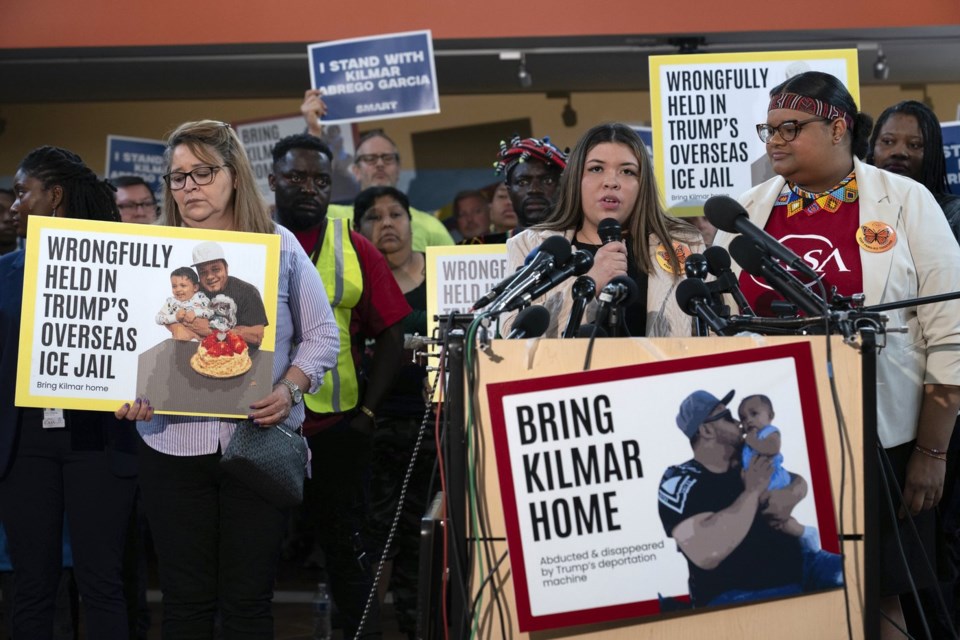GREENBELT, Md. (AP) — A federal judge on Friday ordered the Trump administration to arrange for the return of a Maryland man to the United States after he was mistakenly deported to a notorious El Salvador prison, while a U.S. government attorney was at a loss to explain what happened.
The ruling rejected the White House's claim that it lacks the power to retrieve Kilmar Abrego Garcia, a Salvadoran national, because he is no longer in the U.S. Immigration and Customs Enforcement has corrected deportation errors in previous years, according to Abrego Garcia’s attorney and legal experts alike.
The government filed an appeal immediately after the decision and an official from the Department of Homeland Security doubled down on the government's assertion that Abrego Garcia is a dangerous gang member who should not be allowed back into the country.
ICE expelled the 29-year-old Abrego Garcia last month despite an immigration judge’s 2019 ruling that shielded him from deportation to El Salvador, where he faced likely persecution by local gangs.
“The record reflects that Abrego Garcia was apprehended in Maryland without legal basis ... and without further process or legal justification was removed to El Salvador,” U.S. District Judge Paula Xinis wrote in her order.
Before she issued the ruling, Xinis described the deportation as “an illegal act” and pressed Justice Department attorney Erez Reuveni for answers, many of which he didn't have.
Reuveni conceded to Xinis that Abrego Garcia should not have been removed from the U.S. and shouldn’t have been sent to El Salvador. He couldn’t tell the judge upon what authority he was arrested in Maryland.
“I’m also frustrated that I have no answers for you for a lot of these questions,” he said.
The judge also questioned why Abrego Garcia was sent to the prison in El Salvador, which observers say is rife with human rights abuses.
“Why is he there, of all places?” asked Xinis, who was nominated by President Barack Obama.
“I don’t know,” Reuveni replied. “That information has not been given to me.”
Reuveni had asked the judge for more time — 24 hours — for the government to possibly broker Abrego Garcia's return.
Abergo Garcia's attorney, Simon Sandoval-Moshenberg, told the judge he was dismayed that the government had done nothing to get his client back, even after admitting its errors.
“Plenty of tweets. Plenty of White House press conferences. But no actual steps taken with the government of El Salvador to make it right,” he said.
Sandoval-Moshenberg said the government’s response to its error was essentially to say, “We’ve tried nothing, and we’re all out of options.”
“This is not something that’s outside of the government’s power,” he said, noting that the U.S. routinely extradites gang leaders, drug traffickers and other imprisoned people from other countries.
In legal briefs, Sandoval-Moshenberg asked the court to remove Abrego Garcia from the “torture prison” and “return him to the custody of the United States.”
The White House has cast Abrego Garcia as an MS-13 gang member and doubled down on that claim after Friday's hearing. Tricia McLaughlin, Department of Homeland Security assistant secretary, stated that the U.S. has “intelligence reports that he is involved in human trafficking.”
McLaughlin did not comment on whether the administration would comply with the judge's order. But she said that he would be “locked up and off America’s streets."
“MS-13 gang members murder, rape, and maim for sport,” she said. "It’s shameful that the mainstream media chooses to do the bidding of these vicious gangs while ignoring their victims.”
Abrego Garcia’s attorneys have countered that there is no evidence he was in MS-13. The allegation is based on a confidential informant’s claim in 2019 that Abrego Garcia was a member of a chapter in New York, where he has never lived.
His mistaken deportation, described by the White House as an “administrative error," has outraged many and raised concerns about expelling noncitizens who were granted permission to be in the U.S.
Abrego Garcia had a permit from the Department of Homeland Security to legally work in the U.S., his attorney said. He served as a sheet metal apprentice and was pursuing his journeyman license.
He fled El Salvador around 2011 because he and his family were facing threats by local gangs. In 2019, a U.S. immigration judge granted him protection from deportation to El Salvador. He was released and ICE did not appeal the decision or try to deport him to another country.
Abrego Garcia later married Jennifer Vasquez Sura, a U.S. citizen. The couple are parents to their son and her two children from a previous relationship.
The judge’s ruling on Friday came shortly after Vasquez Sura joined dozens of supporters at a rally in the city of Hyattsville to urge her husband’s immediate return.
Vasquez Sura, who hasn't spoken to her husband since his deportation, urged her supporters to keep fighting for her husband “and all the Kilmars out there whose stories are still waiting to be heard.”
“To all the wives, mothers, children who also face this cruel separation, I stand with you in this bond of pain,” she said during the rally at a community center. “It’s a journey that no one ever should ever have to suffer, a nightmare that feels endless.”
___
Finley reported from Norfolk, Virginia. Associated Press reporter Rebecca Santana in Washington contributed to this report.
Michael Kunzelman And Ben Finley, The Associated Press



